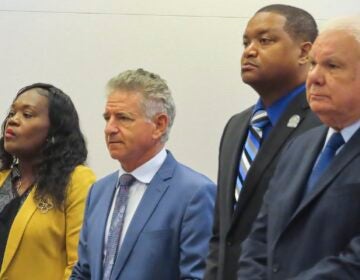Gov. Christie is right to suggest longer school days for New Jersey’s students

Those of you who are not big Chris Christie fans may be forgiven for indulging in a bit of schadenfreude during the Governor’s State of the State address on Tuesday afternoon. (That’s a German word for taking pleasure in in the misfortune of others and a great “Avenue Q” song.) As the Governor wilted over the lectern, audience members buzzed about the latest revelations of Bridgegate and whether his presidential aspirations were toast. In what may be one of the shortest State of the States in history, Christie stumbled through a sorrowful preface (“mistakes were clearly made”) before getting to the point.
You can’t blame him for sticking to his forte; fully one quarter of his speech (here’s the transcript) was devoted to public education reform. Specifically, Christie proposed an extension of the school day and the school year. Currently most N.J. public school students attend school for 180 days a year, the minimum set by state statute. The average school day in N.J. is six and a half hours. Only five states in the country have shorter days.
From the transcript:
“Our school calendar is antiquated both educationally and culturally. Life in 2014 demands something more for our students. It is time to lengthen both the school day and school year in New Jersey…we should take these steps – every possible step – to boost student achievement. And one key step is to lengthen the school day and the school year…This is a key step to improve student outcomes and boost our competitiveness. We should do it now.”
While NJ School Boards Association applauded the proposal (“for more than 30 years, research has shown that increased instructional time is a key to greater academic achievement”), condemnatory reactions from other lobbyists was swift. NJEA (our primary teacher union) issued a reminder that the length of school days and years are subject to negotiations between school boards and local bargaining units. “Parents and educators,” said NJEA, “should have the final say on the length of their school day and school year.”
Education Law Center, primary advocates for kids in poor urban districts, issued this jeer: “The governor should properly fund the school year and day we now provide for our students before putting more cost burdens on New Jersey’s struggling school districts.”
It’s true that local negotiating practices – not to mention funding — are roadblocks to Christie’s proposal, but we’re already ahead of the game. First, we already have a N.J. Assembly bill that sets up an extended time program. Second, we can use some of our top-performing charter schools as models for extending school days and yearsA 1391 is sponsored by Assemblyman Gilbert “Whip” Wilson (D-Camden), who received the honor of escorting Gov. Christie to the podium on Tuesday. His bill proposes a pilot program that extends the school day and year for kids in up to 25 poor urban districts. The attendant costs would be paid for by tax credits to corporations. In a press release issued yesterday, Wilson pointed to the success of an extended-time program currently underway for 20,000 kids in Colorado, Connecticut, Massachusetts, New York, and Tennessee. He added, “I look forward to working with the Governor and the Legislature to pursue this option, which holds benefits for all levels of learning.”There’s the legislative apparatus. But how about the logistics?
Look to our charters. At KIPP’s TEAM Academy Charter School in Newark students attend school from 7:30-4:00 Mondays through Fridays and also go to school two Saturdays a month. The school year begins in August and goes through June. TEAM’s students regularly outperform peers at other area schools despite similar demographics.
But nothing’s that easy in education. Assemblyman Wilson’s bill appears to provide adequate funding for 25 districts (up to $72 million by the third year of the pilot) but that funding will need to be sustained, primarily in the form of teacher salary increases to justify extended work schedules. That’s not so much a problem for charters because salaries are lower and teachers can earn merit bonuses. Traditional districts, however, are under the thumb of a 2 percent annual tax increase cap and this prohibits big payroll hikes. How do you pay teachers more when there’s no money?
Finally, I don’t think that Gov. Christie and Assemblyman Wilson intend to extend school days and years for kids in high-performing suburban districts. Instead we’re creating a two-pronged calendar, one for poor kids and one for not-so-poor kids. This may be educationally sound, even ethical, but let’s be explicit about our intentions. N.J. has one of the most segregated school systems in the country. Now we’re talking about another degree of separation.I still think it’s worth a try, certainly within the confines of a pilot program. We wear the 180-day, six-hour calendar like a shrunken suit. Time for a little breathing room.
___________________________________________________________
Laura Waters is president of the Lawrence Township School Board in Mercer County. She also writes about New Jersey’s public education on her blog NJ Left Behind. Follow her on Twitter @NJLeftbehind.
WHYY is your source for fact-based, in-depth journalism and information. As a nonprofit organization, we rely on financial support from readers like you. Please give today.





